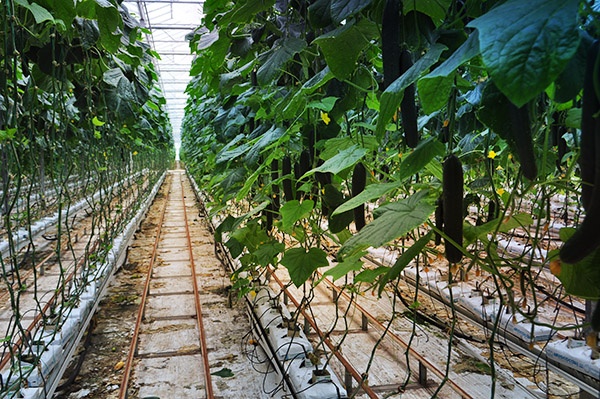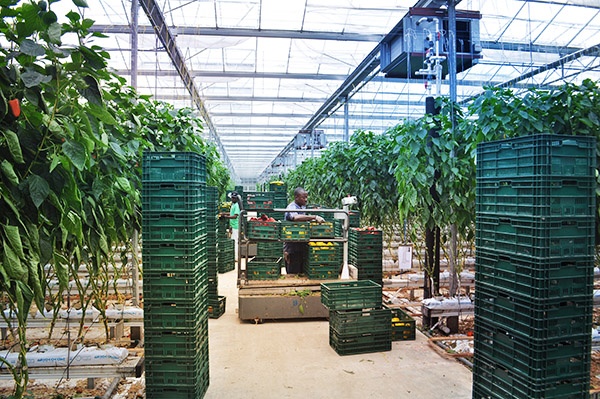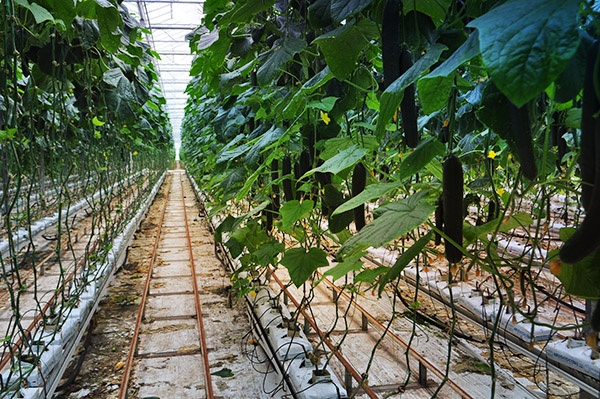Originally published in Issue 16
Lucayan Tropical Produce has been growing greenhouse vegetables in The Bahamas for 12 years, but it has taken some adjustments to find the best crops to grow on an island in paradise.
Since Lucayan Tropical Produce Ltd. began producing greenhouse vegetables in 2004, the company has experienced three major hurricanes, including Hurricane Matthew, this past October. Matthew, which was designated a Category 5 hurricane, had sustained winds as high as 160 mph. The company, which is located on New Providence Island in The Bahamas, operates a 5.5-acre Dalsem glass greenhouse producing cucumbers, lettuce and leafy greens.
While residents and tourists may consider the island to be “paradise,” the climate, cost of electricity and availability of fresh water can make for challenging growing conditions.

“Unlike traditional greenhouse operations we began the company with a concept that included many different types of crops in the same greenhouse,” said company president Cameron Symonette. “We felt that what we gave up on efficiency we would gain back on price. Being on an island, the prices of highly perishable items are generally quite high. We started with five different tomato varieties and three different colored bell peppers in the initial phase of the operation. We had two separate irrigation systems across six irrigation zones. That set up failed to work for us for a number of reasons; mostly because of the inherent difficulty of managing so many different types of crops from both a production perspective and from a packaging logistics/distribution perspective.
“The peppers weren’t a problem, but for the tomatoes, having different varieties with different requirements meant having to change the irrigation strategies. That was a challenge in our environment with the amount of solar radiation and the temperatures. The monthly average differences between day and night temperatures on a daily basis are not really significant for over 50 percent of the year causing challenges with fruit set and germination. That is the number one reason why we changed our approach. Currently we are producing only cucumbers in the greenhouse.”
Best crops for the climate, greenhouse design
While Lucayan Tropical Produce’s core crop is cucumbers, the company is also producing lettuces and leafy greens.
“We chose to focus on cucumbers for two reasons,” said Symonette. “One, because in our environment we are unable to achieve the yield per square meter that is required for tomato production to be commercially viable. In our environment of a high relative humidity and plenty of sunlight, cucumbers grow well. It was just a better crop for us to grow.
“The second reason is the time between when we plant and harvest the cucumbers is much quicker than it is with tomatoes. Any issues that we might have related to a crop failure or if we need to replace old plants, the time to do that is much faster with cucumbers.”

Lucayan Tropical Produce is also producing a variety of lettuces, leafy greens and herbs that it sells domestically.
“Summer temperatures definitely limit the leafy greens we can grow,” Symonette said. “We find the most success growing leafy greens from the beginning of October until the end of May. We currently grow on ebb-and-flow tables, which were originally designed as a propagation area for the crops in the main greenhouse. We didn’t have the luxury of being able to buy our starter seedlings from another local grower so we built the propagation area so we could do it ourselves. Over the last two years we have been running trials with a NFT and a pond system to determine what is the best system for trying to extend our growing season into the summer months.”
Symonette said the company is also interested in building a controlled environment facility to produce lettuces and leafy greens.
“We want to expand our lettuce and leafy greens production during the first quarter of 2017,” he said. “That expansion will take the form of a temperature controlled system with artificial lights. It doesn’t mean vertical growing, but it does mean growing under lights. That system would be built inside our packing area.”
The company distributes its cucumbers, lettuces and leafy greens through two wholesalers.
“Our intention is to sell as much of our product domestically as we can before we export,” Symonette said. “The lettuce and leafy greens are only sold domestically through Bahamas Food Services. Since we’ve started to export the cucumbers, we have been working with Sun Produce in Florida that distributes our product in the United States and Caribbean.
[adrotate banner=”23″]
“The market acceptance of our products has been phenomenal. The taste and shelf life are great. We’re focused on supplementing what we grow in the greenhouses with some growing under lights to add product mixes that we couldn’t grow in our environment that would sell well in our market.”
Making improvements
The greenhouse was initially designed with two 250,000-gallon rain water holding tanks so water that falls on the greenhouse roof is collected and used for irrigation.
“Because of the monthly rainfall patterns, we also have a reverse osmosis system installed in the greenhouse that we only use during a six-week window during the year,” Symonette said. “We do not have access to fresh water, which is a problem with agriculture in general in the country. High property prices and no access to water limit potential growing operations.”
The company has made significant improvements to its irrigation systems over the last 10 years.
“We recently upgraded our water purification system to a combination of ozone and UV filtration which is really working,” Symonette said. “It leads to higher oxygen levels, which in turn leads to better root health.
“The second improvement is in employee training, which is a critical component. Because we have been in business for over 10 years, we have team members who are more experienced and have learned the systems we have developed, which has led to a more efficient operation than when we started.”
Symonette said the company looked extensively at improving climate management with its current greenhouse but determined it was not possible to improve the climate because the cost of electricity is cost prohibitive.
“Any technological solution in an open environment would not increase yields enough to justify the increased costs of electricity,” he said. “The greatest potential opportunity is in an energy-efficient closed growing system for producing leafy greens under lights where the temperature and humidity can be controlled.
“We also have a trial solar panel installation at our facility and are seriously considering expanding that to a size that would run the daytime requirements of the operation.”
Future expansion considerations
Symonette said the biggest issue to maintaining the proper greenhouse climate is the similarity between night and day temperatures.
“That would be the predominant factor, which basically influences what we are able to grow,” he said. “Looking back the greenhouse design focused on protecting the structure from hurricane damage, but ultimately negatively impacted airflow. As we expand greenhouse production we will think about using our growing experience to make some decisions. With the benefit of hindsight and experience, we will make some different choices that will generate greater airflow.”
Symonette said every time the company has experienced a major weather event, such as a hurricane, changes have been made in operations.
“We think about what happened and why it happened and put some thought into how we can prepare in a more sensible way,” he said. “Each storm has brought different learning experiences, but none of those major hurricanes or other weather events has caused us to change the construction.”
Symonette said the company will look at expanding its greenhouse growing area next year.
“We’re not sure what form that will take,” he said. “There are no government restrictions on making that expansion. The government is very supportive of us and encourages agricultural participation.”
For more: Lucayan Tropical Produce,
(242) 377-0125; info@ lucayantropical.com.
David Kuack is a freelance technical writer in Fort Worth, Texas; dkuack@gmail.com.


